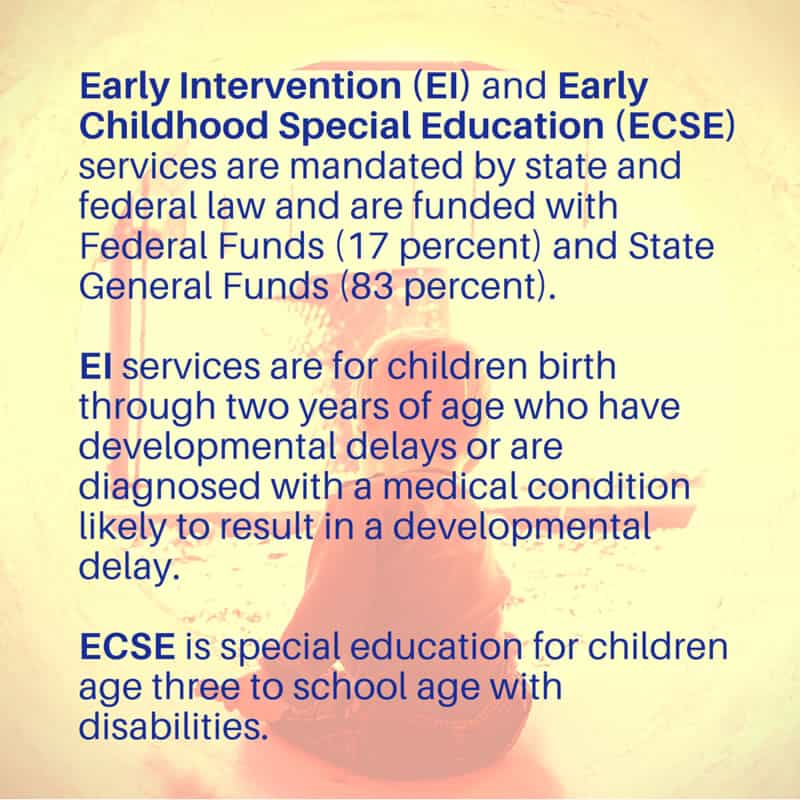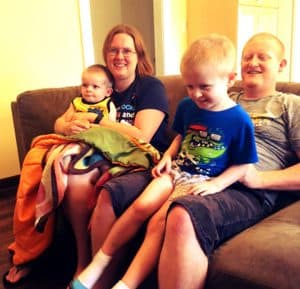After her son was diagnosed with autism, Ashley Wells navigated what felt like a maze of information to access the resources she and her family needed. Once she connected with Early Intervention (EI) through the Douglas Education Service District (Douglas ESD), staff began providing crucial supports to help her son and her family. “Since starting with Early Intervention, our therapists and teachers have been great,” she says. “They have great communication and always let us know about progress.”Jace, who is four years old and nonverbal, is receiving Early Childhood Special Education services and is now in preschool. He loves the stimulation, attention, and structure of the school day. Wells says his teachers create lots of custom exercises for him and communicate using picture cards and other tools.

Early Intervention (EI) and Early Childhood Special Education (ECSE) Definitions
Early Intervention reduces need for ECSE
When EI services are adequate and tailored to a child’s unique needs, the evidence shows that children respond extremely well to the services. In 2014, 91 to 95 percent of Oregon infants and toddlers participating in EI services showed developmental improvements. Some 61 to 81 percent of all infants and toddlers demonstrated substantial growth, meaning they will need fewer ECSE and Special Education services in preschool and K-12. More than 27 percent of participating preschool children entered kindergarten without an Individualized Education Program (IEP), 3.5 percentage points above the state target.
Her youngest, Ian, needs an array of therapies, including speech, physical, and occupational. “Our teachers and therapists have been wonderful,” Wells says. “We’ve developed friendships, they’re like family.”But the Douglas County family has an advantage. They live in Roseburg where most of the county’s EI and Early Childhood Special Education (ECSE) services are provided. Families located far from Roseburg have to make the drive, or hope for a visit by Douglas ESD staff, both of which can be inefficient and expensive.
This is especially true for communities such as Yoncalla, located 30 miles north of Roseburg. Costs incurred by traveling families are tough to overcome, especially when many families have limited incomes and difficulty with transportation. For Douglas ESD, travel time means fewer kids served. But Early Works in Yoncalla is building partnerships to improve early learning and referral to programs like EI or ECSE.
“We know families need EI and ECSE services,” says Erin Helgren, the Early Works site liaison in Yoncalla. “But we also know we need to educate providers on how to screen, educate families on how to advocate for their children, and ensure services are reaching rural Oregon.” Early Works is a partnership between Children’s Institute, The Ford Family Foundation and Yoncalla School District.
Early Intervention and Early Childhood Special Education are federally mandated programs that stem from the Individuals with Disabilities Education Act (IDEA), a piece of legislation that has been part of the U.S. education landscape since its first iteration in 1975. It calls for tailored services for children from birth to school age with developmental delays and disabilities. Services are meant to strengthen healthy and on-track development and enhance physical, cognitive, communication, and social emotional development, as well as build caregiving skills for parents and families.
With EI/ECSE services, children gain skills and are better prepared for school. Families, parents, and caregivers are better prepared to support children with disabilities. And early developmental gains translate into reduced costs for the K-12 system.
EI and ECSE caseloads in the state are up; in 2015 they rose by nearly 4 percent due to an increase in developmental screenings by physicians and others. The increase is a result of incentives for providers to screen early and capture more kids in prevention and intervention efforts. The incentives flow through the state’s Coordinated Care Organizations, established in 2011 to streamline health services, create coordinated and efficient care, and save public dollars.
Increased screenings equate to more kids identified with developmental needs. But rising caseloads need to be met with adequate services. Without sufficient funding, the goal of serving children early to save costs later can’t be met.
Sondra Williams, the EI/ECSE coordinator for the Douglas Education Service District (Douglas ESD), says enrollments are up by about 50 percent. “In the last two years, we’ve seen the numbers grow from about 200 children at the beginning of the school year to 300 plus. We’re seeing more kids on the autism spectrum and more kids needing help with physical, speech, and occupational therapies.”
Parents and families in rural Douglas County are becoming better informed about the importance and role of EI/ECSE services. Physicians are screening more often and referring sooner. And once developmental delays are identified, children under age five must be served immediately according to federal law.
Pat Sublette, assistant superintendent of special education for Douglas ESD, says her community has additional challenges in the effort to provide high-quality EI/ECSE services to more families. “In rural communities, in-home early intervention services come with greater transportation time and costs. Perhaps the biggest problem is that we also have difficulty attracting trained staff due to our more isolated location and less competitive salaries. Services, unfortunately, can get thinned down.”
Sublette also says that despite knowing the EI/ECSE services are effective, Medicaid reimbursements can be difficult to process and count on. “We’ve seen basic supports turned down, such as wheelchairs. Payments are often hard to secure which limits our providers.”

Helping families in Douglas County connect to EI/ECSE services.
EI/ECSE services are required for any qualifying child and are based on developmental needs. Families aren’t charged for services and there are no economic qualifications to receive services. Some kids referred to EI/ECSE services will need rigorous services for the rest of their life. Some kids will need focused support, such as intensive speech therapy, and make significant gains prior to entering kindergarten. Improving how the system responds to and prepares for increasing demands for services is crucial for Oregon families.
Wells says EI/ECSE services have helped her and her husband at home with both boys. “We’ve learned so much… so many different tactics and strategies that help us with our kids, help us communicate and address their needs.”
In Yoncalla, Helgren says that more thorough screening for EI/ECSE services has just started and is already improving for families. Parents are also learning about available resources, in part due to Oregon’s new preschool program, Preschool Promise. Improving preschool means improvements to screening and referral for EI/ECSE.
“Preschool Promise staff will screen more often and consistently,” Helgren says. “Families will learn about Early Intervention and Early Childhood Special Education services. This is what aligned and coordinated efforts look like. The biggest challenge will be backing up our efforts with qualified staff to give our communities what they need.”
